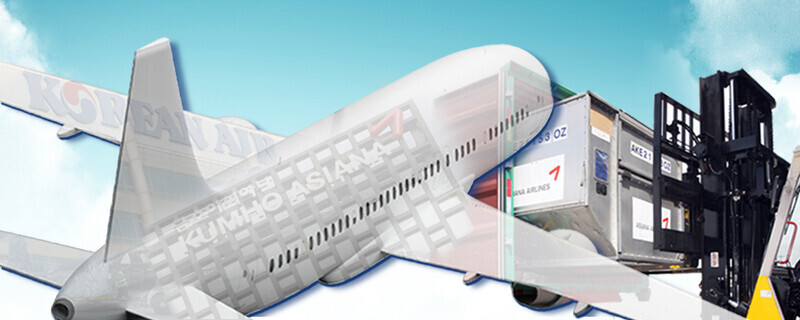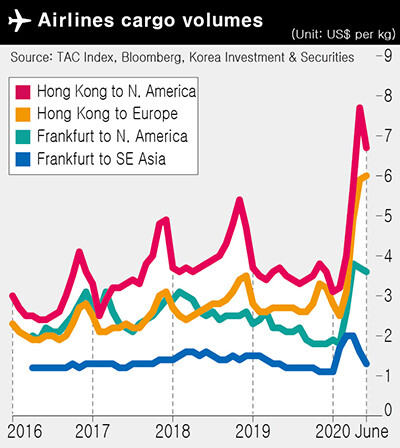hankyoreh
Links to other country sites 다른 나라 사이트 링크
S. Korean airlines expected to bounce back from COVID-19 losses in 2nd quarter

After suffering a direct hit from the COVID-19 pandemic, major South Korean airlines are now being projected to record profits for the second quarter. While recovering last year’s levels of passenger demand remains a distant goal, cargo transport has come to the unexpected rescue. According to figures on international cargo volumes released by Incheon International Airport released on June 8, total volumes amounted to 219,772 tons, down 4% from 228,955 tons in May 2019. But over the same period, cargo volumes for Korean Air and Asiana actually increased by 13.5% and 4.3%, respectively. While the overall pie has gotten smaller, both of South Korea’s major national airlines enjoyed boosts in their cargo transport. With international passenger traffic down 98.1% from May 2019, cargo transport has emerged as a life support system for the two airlines.
“Korean Air and Asiana Airlines account for some of the highest proportions of cargo-related sales globally. That fact combined with their geographic advantage has led to the increase in transport volumes,” said Choi Go-woon, an analysis with Korea Investment & Securities.
“South Korea’s major airlines are reaping a lot of the rewards from cargo transport,” he concluded.
Freight charges skyrocket as passengers flights plummet

Drawing even more attention than the increase in volume is the steep rise in freight charges. As the effects of the coronavirus have led to a sharp decline in passenger traffic and a shortage of supply flights transporting cargo, freight charges have skyrocketed -- as 40-50% of air freight is transported as “belly cargo” in passenger aircraft. The TAC index for air freight charges showed a level of US$3.10 per kilogram for routes between Hong Kong and North America as recently as January; that rate subsequently jumped to US$5.70 in April and to US$7.70 in May, more than double (108.4%) the level in May 2019. While freight charges have fallen by around one dollar this month to US$6.70, the level is still 94.4% higher than the average for May 2019.
“Ironically, the damage caused by the coronavirus has resulted in a boost in demand for the freight sector, with Korean Air and Asiana Airlines expected to successfully achieve positive numbers for the second quarter,” said Kim Young-ho, an analyst with Samsung Securities.
“Asiana is even expected to record its highest ever profits in the second quarter,” Kim predicted.
Korean Air to use seats for cargo transport
Accustomed to using only cargo aircraft and the freight compartments of their passenger aircraft to transport cargo, airlines have been reluctant to use passenger seats. Starting on June 11, Korean Air plans to load cargo onto the seats in two aircraft. While it has used overhead bins within passenger aircraft cabins in the past, this would be the first time it has used cabin seats to transport freight.
“We plan to attach special ‘cargo seat bags’ to the existing cargo for transport,” explained a Korean Air official.
How long can the current trend be sustained? Ha Joon-young, an analyst with Hi Investment and Securities, said, “Air freight charges are expected to begin gradually declining in June as passenger transport increases.”
“But given the time that will be needed for international route passenger supplies to return to their pre-coronavirus levels, there’s a good chance the rise in air freight charges will continue through the end of the year,” he predicted.
The airlines are also predicting ample demand for the time being. In a recent conference call, a Korean Air representative said, “In addition to disease control and medical supplies such as face masks and diagnostic kits, there’s also quite a large backlog of ordinary freight.”
Predicting that the freight demand would continue for some time, the representative said, “There will be an increase in imports of cherries and other fresh cargo in North America beginning in June.”
By Park Su-ji, staff reporter
Please direct comments or questions to [english@hani.co.kr]

Editorial・opinion
![[Editorial] Penalties for airing allegations against Korea’s first lady endanger free press [Editorial] Penalties for airing allegations against Korea’s first lady endanger free press](https://flexible.img.hani.co.kr/flexible/normal/500/300/imgdb/original/2024/0502/1817146398095106.jpg) [Editorial] Penalties for airing allegations against Korea’s first lady endanger free press
[Editorial] Penalties for airing allegations against Korea’s first lady endanger free press![[Editorial] Yoon must halt procurement of SM-3 interceptor missiles [Editorial] Yoon must halt procurement of SM-3 interceptor missiles](https://flexible.img.hani.co.kr/flexible/normal/500/300/imgdb/child/2024/0501/17145495551605_1717145495195344.jpg) [Editorial] Yoon must halt procurement of SM-3 interceptor missiles
[Editorial] Yoon must halt procurement of SM-3 interceptor missiles- [Guest essay] Maybe Korea’s rapid population decline is an opportunity, not a crisis
- [Column] Can Yoon steer diplomacy with Russia, China back on track?
- [Column] Season 2 of special prosecutor probe may be coming to Korea soon
- [Column] Park Geun-hye déjà vu in Yoon Suk-yeol
- [Editorial] New weight of N. Korea’s nuclear threats makes dialogue all the more urgent
- [Guest essay] The real reason Korea’s new right wants to dub Rhee a founding father
- [Column] ‘Choson’: Is it time we start referring to N. Korea in its own terms?
- [Editorial] Japan’s rewriting of history with Korea has gone too far
Most viewed articles
- 160% of young Koreans see no need to have kids after marriage
- 2[Editorial] Penalties for airing allegations against Korea’s first lady endanger free press
- 3Presidential office warns of veto in response to opposition passing special counsel probe act
- 4Hybe-Ador dispute shines light on pervasive issues behind K-pop’s tidy facade
- 5Months and months of overdue wages are pushing migrant workers in Korea into debt
- 6Japan says it’s not pressuring Naver to sell Line, but Korean insiders say otherwise
- 7S. Korea “monitoring developments” after report of secret Chinese police station in Seoul
- 8OECD upgrades Korea’s growth forecast from 2.2% to 2.6%
- 9[Reporter’s notebook] In Min’s world, she’s the artist — and NewJeans is her art
- 10[Guest essay] Maybe Korea’s rapid population decline is an opportunity, not a crisis